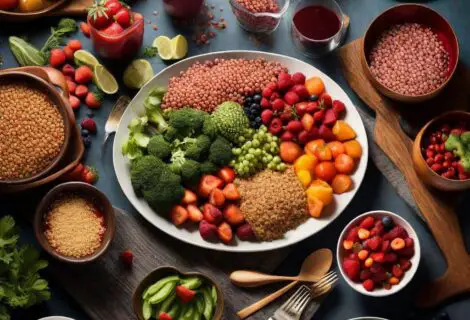Going Vegan: 5 Tips to Starting a Vegan Lifestyle
A Vegan Lifestyle and Why Should You Consider It?
A vegan lifestyle is based on a plant-based diet and excludes the use of all animal products. It is an ethical and compassionate way of living that has many health benefits, as well as environmental benefits. This lifestyle choice has grown in popularity over the years, with more people choosing it for its health, ethical, and environmental benefits. In this article, we will explore what a vegan lifestyle entails and why you should consider it.
What is a Vegan Lifestyle?
The vegan lifestyle excludes the use of all animal products. This means no meat, dairy, eggs, or honey. Some people identify as vegetarian-vegan as well, which means they avoid meat but still consume dairy and eggs. Vegans also tend to be big supporters of animal rights and welfare because they understand the ethical implications of killing an animal for food consumption when you have the choice not to do so.
Why Should I Consider a Vegan Lifestyle?
There are many benefits associated with veganism and these benefits take many forms. Veganism is the practice of abstaining from the use of animal products, particularly in the diet but also in other areas. A follower of veganism is known as a vegan, and some vegans also avoid using certain animal products such as leather and wool. There are many benefits associated with veganism and these benefits take many forms: reduction or elimination of environmental impacts, reduction in health-care costs, improved personal health outcomes, improved conditions for farm animals, ending cruelty to animals, etc. There are some potential adverse effects too, however; increased risk for nutritional deficiencies because some nutrients can only be found in food from animals.
Tips for Going Vegan – An 8-Step Guide
1: Do some research
2: Find a vegan community online and offline
3: Start slowly with a vegan diet (try switching one day at a time)
4: Use the free resources available online to learn more about the vegan lifestyle
5: Make sure you get enough protein, iron, and calcium in your diet
6: Follow an exercise routine that includes cardio, strength training, and stretching
7: Take note of what you like and don’t like about being plant-based.
8: Join a plant-based Facebook group or find a local vegan restaurant in your area.
5 Tips for Adjusting to the Vegan Lifestyle
There are many ways to make the transition from a non-vegan diet to a vegan diet. Here are my top five tips for how to make the transition easier, and how you can adjust your new diet as needed.
1.Start slowly – Make small changes in your veganism until you feel comfortable enough with them to take on more challenges.
2. Try going meatless one day per week – This will help you start understanding the benefits of being vegan without feeling like you’ve completely changed everything right away and will allow your body time to adjust before taking on more drastic changes.
3. Educate yourself – Learn about diet, nutrition, and farming so that you can make a more informed decision about your diet. Read books on veganism, watch documentaries, and do research to better understand what it means to be vegan.
4. Stay connected with the community – There is support out there for anyone who would like it! Join a vegan group on Facebook or start one of your own. Helping others helps you stay inspired and motivated in your new life as well as helps you feel less alone in this journey.
5. Taking small and gradual steps is the best way to start when changing one’s current lifestyle. The initial step may be the most difficult, but it’s also an important milestone in the journey toward a healthier lifestyle. Breaking down large goals into smaller, manageable tasks can make them seem much more achievable and will help you stay on track to reaching your ultimate goal.
Finding Delicious & Nutritious Plant-Based Recipes For Every Meal
I’m no longer on a diet. For years, I’ve struggled with my weight. Now I’m finally happy with the way I look and at peace with how much food is in my belly. But as someone who has had weight issues since before the time we could type “Diets” into search engines, it feels weird to say that I have changed my eating habits and am no longer trying to lose pounds. It just feels like giving up on something important to me now when all of these rules about calorie counting and eating fewer carbs, more protein, etc., used to be so important for my self-esteem. The fact is, I’m not going to ever completely lose weight and be at my “goal” weight, so it just feels cheesy or like a lie to say that I’m still trying to watch what I eat. That’s not being honest with myself and it doesn’t feel good anymore. What do you think?
You may also like to read my posts “Lose Weight and Feel Great on a Plant-Based Diet” and “The China Study: Revolutionizing Our Understanding of Nutrition and Health.”
Beet-ing the Odds: The Surprising Benefits of Eating Beets
FAQ
Q: What does going vegan mean?
A: Going vegan means adopting a lifestyle that excludes animal products, such as meat, dairy, eggs, and honey, as well as any by-products from animals, like gelatin. Vegans also avoid products tested on animals and those that involve animal exploitation or cruelty, like fur and leather.
Q: Why do people choose to go vegan?
A: People choose to go vegan for various reasons, including health, environmental, and ethical concerns. Many believe that a plant-based diet can prevent and treat chronic diseases. Additionally, it reduces one’s carbon footprint and promotes animal welfare and cruelty-free living.
Q: What are the health benefits of a vegan lifestyle?
A: A well-planned vegan diet can provide all the essential nutrients your body needs. Benefits include lower risks of heart disease, hypertension, type 2 diabetes, certain types of cancer, and obesity. Vegans often have lower cholesterol levels and healthier body mass indices.












